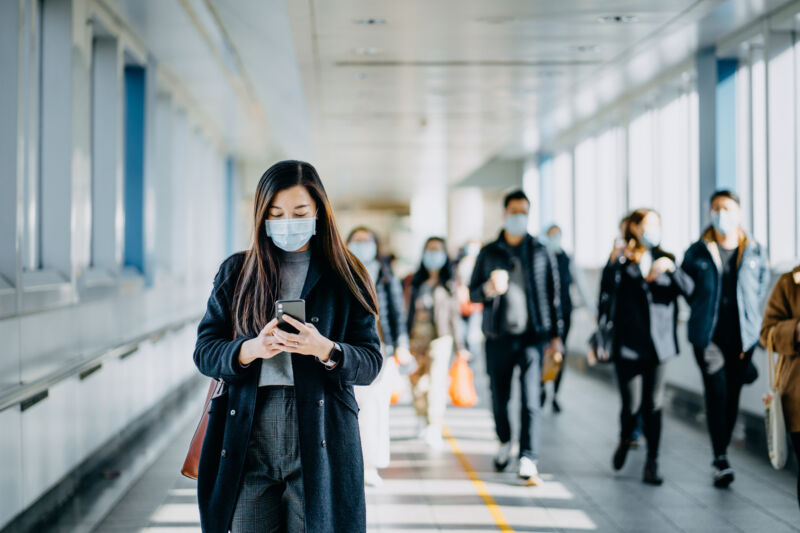Do masks work? It’s a query of physics, biology, and habits
[ad_1]

On March 28, 2020, as COVID-19 instances started to close down public life in a lot of america, then-Surgeon Common Jerome Adams issued an advisory on Twitter: Most of the people shouldn’t put on masks. “There may be scant or conflicting proof they profit particular person wearers in a significant means,” he wrote.
Adams’ recommendation was in step with messages from different US officers and the World Well being Group. Days later, although, US public well being leaders shifted course. Masks-wearing was quickly a pandemic-control technique worldwide, however whether or not this technique succeeded is now a matter of heated debate—significantly after a serious new evaluation, launched in January, appeared to conclude that masks stay an unproven technique for curbing transmission of COVID-19 and different respiratory viruses.
“There’s nonetheless no proof that masks are efficient throughout a pandemic,” the examine’s lead creator, doctor, and epidemiologist Tom Jefferson, just lately instructed an interviewer.
Many public well being specialists vigorously disagree with that declare, however the examine has caught consideration, partly, due to its pedigree: It was revealed by Cochrane, a not-for-profit that goals to carry rigorous scientific proof extra squarely into the follow of medication. The group’s extremely regarded systematic opinions have an effect on scientific follow worldwide. “It’s actually our gold normal for evidence-based drugs,” stated Jeanne Noble, a doctor and affiliate professor of emergency drugs on the College of California, San Francisco. One epidemiologist described Cochrane as “the Bible.”
The new evaluate, “Bodily interventions to interrupt or cut back the unfold of respiratory viruses,” is an up to date model of a paper revealed within the fall of 2020. It dropped at a time when debates over COVID-19 are nonetheless simmering amongst scientists, politicians, and the broader public.
For some, the Cochrane evaluate supplied vindication. “Masks mandates had been a bust,” conservative columnist Bret Stephens wrote in The New York Occasions final week. “These skeptics who had been furiously mocked as cranks and sometimes censored as ‘misinformers’ for opposing mandates had been proper.”
In the meantime, masks proceed to be beneficial by the US Facilities for Illness Management and Prevention, which describes them as “a important public well being instrument.” And this winter, some faculty districts issued short-term mandates in an effort to curb not simply COVID-19, however different respiratory viruses, together with influenza and RSV.
The polarized debate conceals a murkier image. Whether or not or not masks “work” is a multilayered query—one involving a mixture of physics, infectious illness biology, and human habits. Many scientists and physicians say the Cochrane evaluate’s findings had been, in a strict sense, appropriate: Excessive-quality research often called randomized managed trials, or RCTs, don’t sometimes present a lot profit for masks wearers.
However whether or not which means masks don’t work is a harder query—one which has revealed sharp divisions amongst public well being researchers.
The precept behind masks is simple: If viruses like SAR-CoV-2 or influenza can unfold when droplets or bigger particles journey from one individual’s nostril and mouth into one other individual’s nostril and mouth, then placing up a barrier might sluggish the unfold. And there’s definitely proof that surgical masks can block some comparatively giant respiratory droplets.
Early within the pandemic, although, some researchers noticed proof that SARS-CoV-2 was spreading by way of tinier particles, which might linger within the air and higher slip round or via surgical and material masks. “Sweeping masks suggestions—as many have proposed—is not going to cut back SARS-CoV-2 transmission,” respiratory safety specialists Lisa Brosseau and Margaret Sietsema wrote in an April 2020 article for the Middle for Infectious Illness Analysis and Coverage on the College of Minnesota.
Their colleague Michael Osterholm, a distinguished epidemiologist, was extra blunt: “By no means earlier than in my 45-year profession have I seen such a far-reaching public advice issued by any governmental company with no single supply of information or data to help it,” he stated on a podcast that June. (The Minnesota heart receives funding from 3M, which manufactures each surgical masks and respirators.)
In a current interview with Undark, Brosseau pressured that she thinks material and surgical masks have some protecting profit. However she and others, together with Osterholm, have urged policymakers to emphasise tight-fitting respirators like N95s, relatively than looser-fitting material and surgical masks. That is as a result of there’s clear proof that respirators can successfully ensnare these tiny particles. “A well-fitting, good high quality respirator will entice the virus, virtually all of it, and can enormously cut back your publicity to it,” stated Linsey Marr, an engineering professor at Virginia Tech who research the airborne transmission of viruses.
[ad_2]
No Comment! Be the first one.